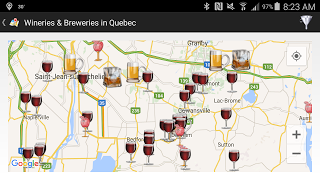 Immediately north of Vermont lies a wine region that is relatively unknown to most American wine consumers. It is the Brome-Missisquoi Wine Route located in the Eastern Townships, Quebec Province. This 85 mile route contains 21 wineries, some of the oldest in Quebec, and produces 60% of Quebec’s wine production. These wines are made from cold climate grapes, Frontenac and Marquette for reds; Seyval Blanc and Vidal Blanc for whites. Ice wine is prevalent as is hard cider, even iced apple cider. Wine lovers who reside in Vermont and northern New York have easy access to the region, but I'd recommend the area for a long weekend for those who require more travel. I visited the region during a day trip from Montreal, basically an hour drive, and visited three wineries. And of course, theCompass Winery, Brewery, Distillery Locator Mobile App, guided us to these wineries.
Immediately north of Vermont lies a wine region that is relatively unknown to most American wine consumers. It is the Brome-Missisquoi Wine Route located in the Eastern Townships, Quebec Province. This 85 mile route contains 21 wineries, some of the oldest in Quebec, and produces 60% of Quebec’s wine production. These wines are made from cold climate grapes, Frontenac and Marquette for reds; Seyval Blanc and Vidal Blanc for whites. Ice wine is prevalent as is hard cider, even iced apple cider. Wine lovers who reside in Vermont and northern New York have easy access to the region, but I'd recommend the area for a long weekend for those who require more travel. I visited the region during a day trip from Montreal, basically an hour drive, and visited three wineries. And of course, theCompass Winery, Brewery, Distillery Locator Mobile App, guided us to these wineries.Vignoble de L'Orpailleur
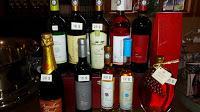
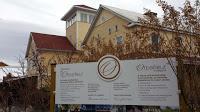 One of Quebec's oldest wineries, L'Orpailleur (The Goldseeker) was founded in 1981 with the first wines available for sale in 1985. This visit was my first chance viewing actual cold climate vineyard operations in practice, such as hilling where the graft between rootstock and vine is covered with soil. This practice was introduced to the Finger Lakes by Dr. Frank and which most Finger Lakes wineries still implement. The winery's portfolio ranges from sparkling wine to ice wine with white, orange, rosé, and red wines in between. One of their original wines was the L’Orpailleur Blanc ($15) a 50-50 blend of Seyval Blanc and Vidal Blanc. This was one of my favorites during our visit, it is simple, yet complex with a big aroma and citrus flavors. The two sister wines, L’Orpailleur Rosé ($15) and L’Orpailleur Rouge ($15) where both nice values with the Seyval Noir rosé exposing bright berry flavors and the Frontenac red wine boasting mellow dark fruit with plenty of fresh acids on the tail.
One of Quebec's oldest wineries, L'Orpailleur (The Goldseeker) was founded in 1981 with the first wines available for sale in 1985. This visit was my first chance viewing actual cold climate vineyard operations in practice, such as hilling where the graft between rootstock and vine is covered with soil. This practice was introduced to the Finger Lakes by Dr. Frank and which most Finger Lakes wineries still implement. The winery's portfolio ranges from sparkling wine to ice wine with white, orange, rosé, and red wines in between. One of their original wines was the L’Orpailleur Blanc ($15) a 50-50 blend of Seyval Blanc and Vidal Blanc. This was one of my favorites during our visit, it is simple, yet complex with a big aroma and citrus flavors. The two sister wines, L’Orpailleur Rosé ($15) and L’Orpailleur Rouge ($15) where both nice values with the Seyval Noir rosé exposing bright berry flavors and the Frontenac red wine boasting mellow dark fruit with plenty of fresh acids on the tail.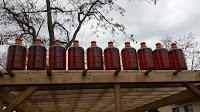
Aging La Part Des Anges de L’Orpailleur
The most interesting wine was their La Part Des Anges de L’Orpailleur ($18), 100% Seyval Blanc where the wine is matured in demi-john containers "subjected to the rigors of our Québec’s climate". This is a succulent wine which obtains an oak character of honey and caramel mixed with the citrus flavor of the grape.The L’Orpailleur Réserve ($17) and L’Orpailleur Ice Wine ($29) were other favorites within our party with the first an 80-20 blend of Seyval and Vidal and the later 100% Vidal Blanc. The Reserve featured a maple character whereas the Ice Wine was somewhat tropical.
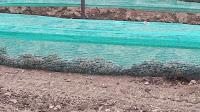
Grapes protected from birds,
ready for the freeze
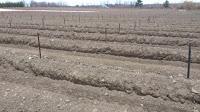
Hilling up the graft
During our next visit I want to allocate more time in order to take one of their guided tours - particularly the Effervescence tour where one participant gets to sabre a L’Orpailleur Brut bottle.UNION LIBRE cidre & vin
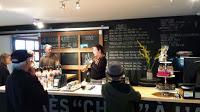
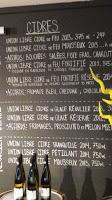
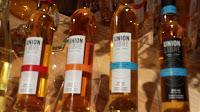
Vignoble les Trois Clochers
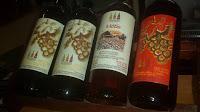
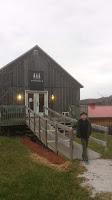
Je adore le vin du Québec.
